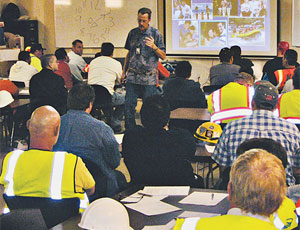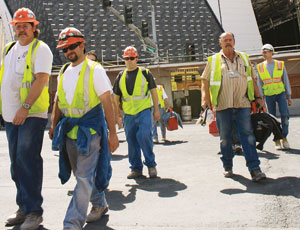My first workday at CityCenter—the Las Vegas Strip’s $8.6-billion mixed-use development, the country’s largest privately financed project—started last fall at the pitch- black hour of 6:30 a.m. I was nervous about my decision to shadow new construction hires during their safety training. Six workers had died on the project since 2007, sparking pickets and pressure that led to mandatory safety training. In the back of my mind was the fact that my brother-in-law, Darin, had suffered a near-fatal construction accident about a year earlier at another project and had returned to work at CityCenter. Now, months after my first day of training at CityCenter, the project’s safety crisis seems strangely distant, pushed from mind by the headlines about the just-concluded financial pact between the developers to finish the project. But I was determined to see for myself what happens in the middle of a safety turnaround.
So there I was on a cool, eerily quiet October morning when a crush of ragged work cars and pickup trucks converged onto Dean Martin Drive for the morning shift change. The sole access road onto the jobsite is a narrow stretch of asphalt that takes an hour to navigate a quarter mile. Some workers riding motorcycles weave in between cars for shorter travel times. New hires are immediately corralled into a mandatory two-hour orientation held inside a makeshift classroom in the basement of the employee parking garage. A safety trainer from Perini Building Co., the project’s Framingham, Mass.-based lead contractor, does the talking.
It feels like the first day of school. There is excited talk, off-color jokes, old-friend reunions and nervous glances. People size one another up and separate into clusters—ironworkers, carpenters and Spanish-speaking laborers. The room at the all-union project fills with 70 men ranging in age from their 20s to their 50s. Everyone has been called up to meet City- Center’s insatiable manpower needs. The 18.7-million-sq-ft project is the equivalent of nine Empire State Buildings going up simultaneously. At the time the Empire State Building was constructed, expectations were that one worker would die for each floor that was built: the final number was much lower. CityCenter thankfully is judged by today’s safer standard.
Outfitted in frayed blue jeans and cotton T-shirts, the workers share a similar style: goatees and handlebar mustaches, tattooed forearms and stiff leather boots. Everyone carries plastic lunch coolers and weathered hardhats caked with stickers of employers, projects and skill certifications. The labels serve as merit badges, narrating prior work history and experience. Andy Campbell, a wiry Perini safety trainer and former paramedic, delivers a blunt and at times abrasive orientation speech. Everything is translated into Spanish.
“A lot of people are talking smack about this project,” Campbell says. “We are doing our best to remove the knuckleheads to make it as safe as possible.”
CityCenter earned the grisly nickname “CityCemetary” from its trade workers because of the six well-publicized deaths and the 1,000 accidents requiring medical attention. The fatalities spanned 18 months, starting in February 2007, when a concrete form collapsed and crushed carpenter Bobby Lee Tohannie, 44. The string ended in May 2008, when a crane counterweight system crushed operating engineer Dustin Tarter, 39, as he serviced the machine. Unions, workers and elected officials pressured the project owners and managers into providing 10 hours of required federal safety training for everyone on-site. I am part of the new class.
佩里尼(Perini)的工作人员分发了就业文书工作,副本翻译成西班牙语。规则禁止酒精和毒品,涂鸦,摔跤,跑步,未报告的事故和马匹。员工必须签署法律豁免,以确认他们对工作政策和违规后果的充分理解。不遵守任何政策,都可以立即终止米高梅海市rage项目。新利18备用网址违规者还面临至少一年中佩里尼工作的一年停赛。为了提出他的观点,坎贝尔堆叠了被吊销的工作卡,其中包括校长和经理的一些脚踝,在房间前高。演讲强调工人对自己的安全和福利以及周围工作的人的责任。
“A foreman or project manager oversees at least 30 people,” Campbell says. “They are not standing over us like an umpire watching every move we make.”
Live To Spend
An average CityCenter journeyman earns $80,000 a year—more than many college graduates. Project officials want workers to take home fat paychecks and live to spend them, Campbell says. It is a message repeated like a mantra during orientation and training. A deepening recession and rising unemployment are other touchstones Campbell uses to unite the ideas of employment, safety and productivity. Break the rules and you are out. “Is it worth losing your job?” he asks.
Campbell gives the same orientation speech once a day to about 100 new workers. “Communicate with each other, work together, and we will get this job done,” he says.
坎贝尔在他的方向上从未直接提到CityCenter严酷的致命事故历史。我无法想象这不是深夜餐桌谈话的主题。但是说话被认为是不幸的...


